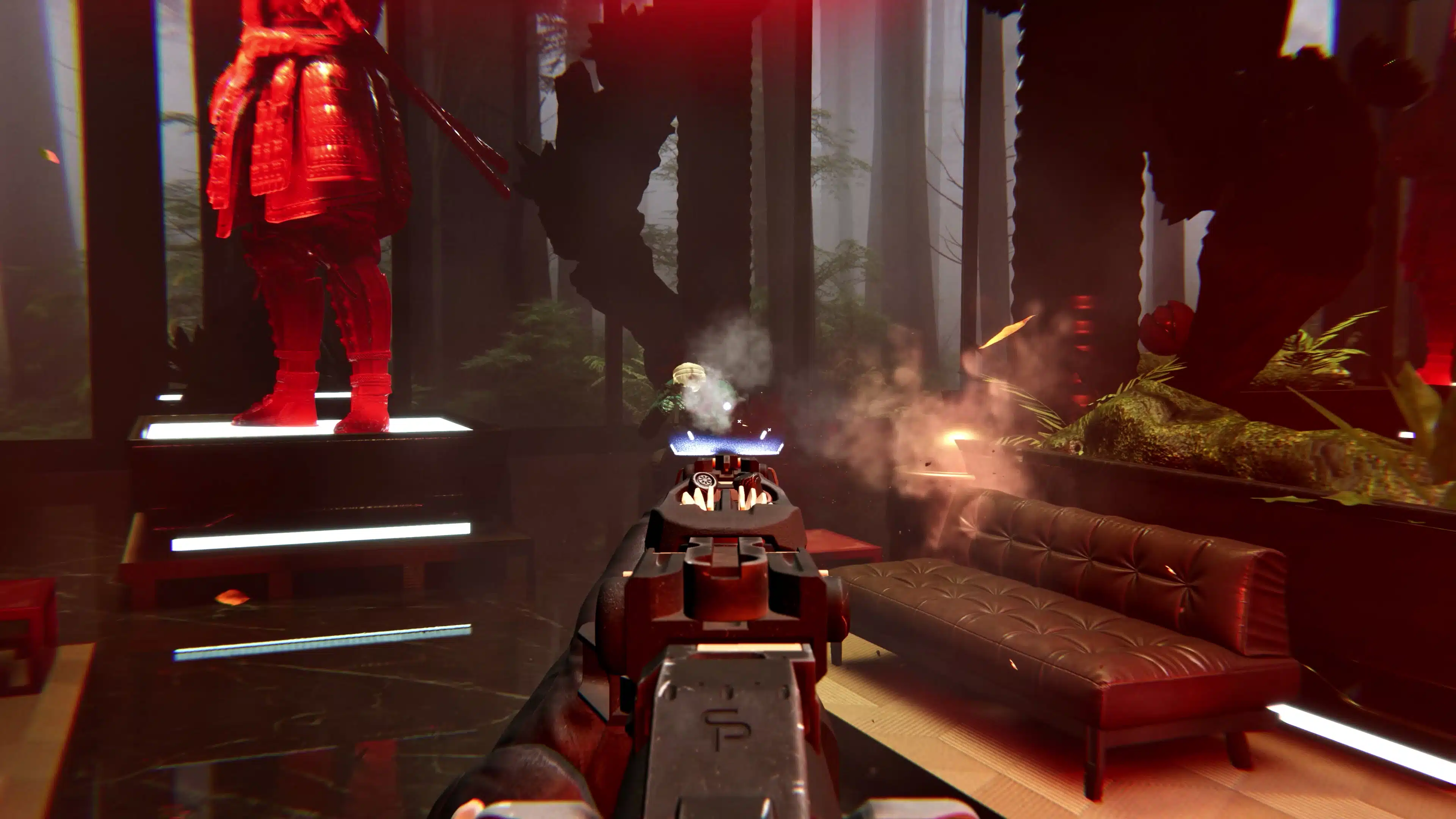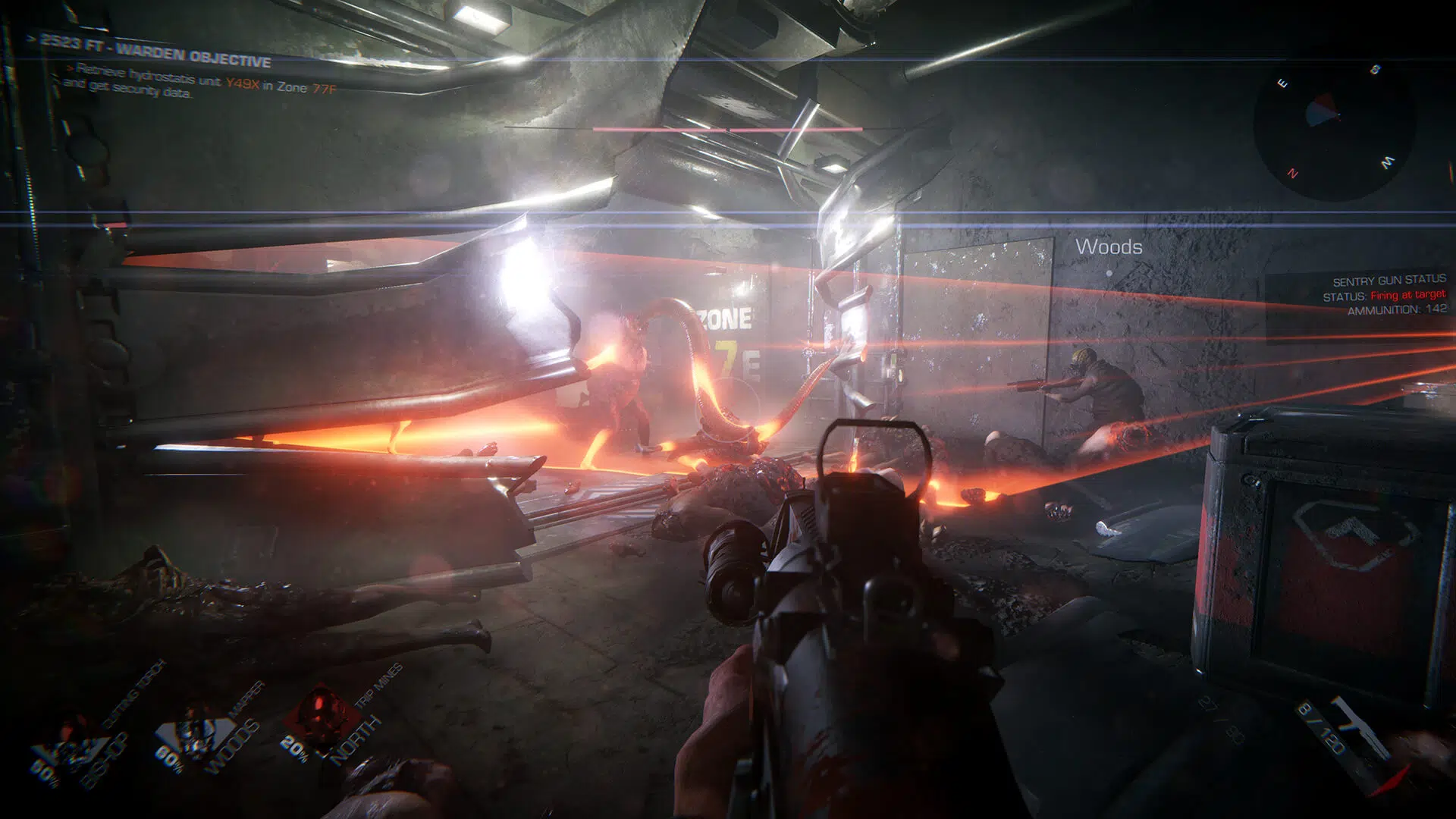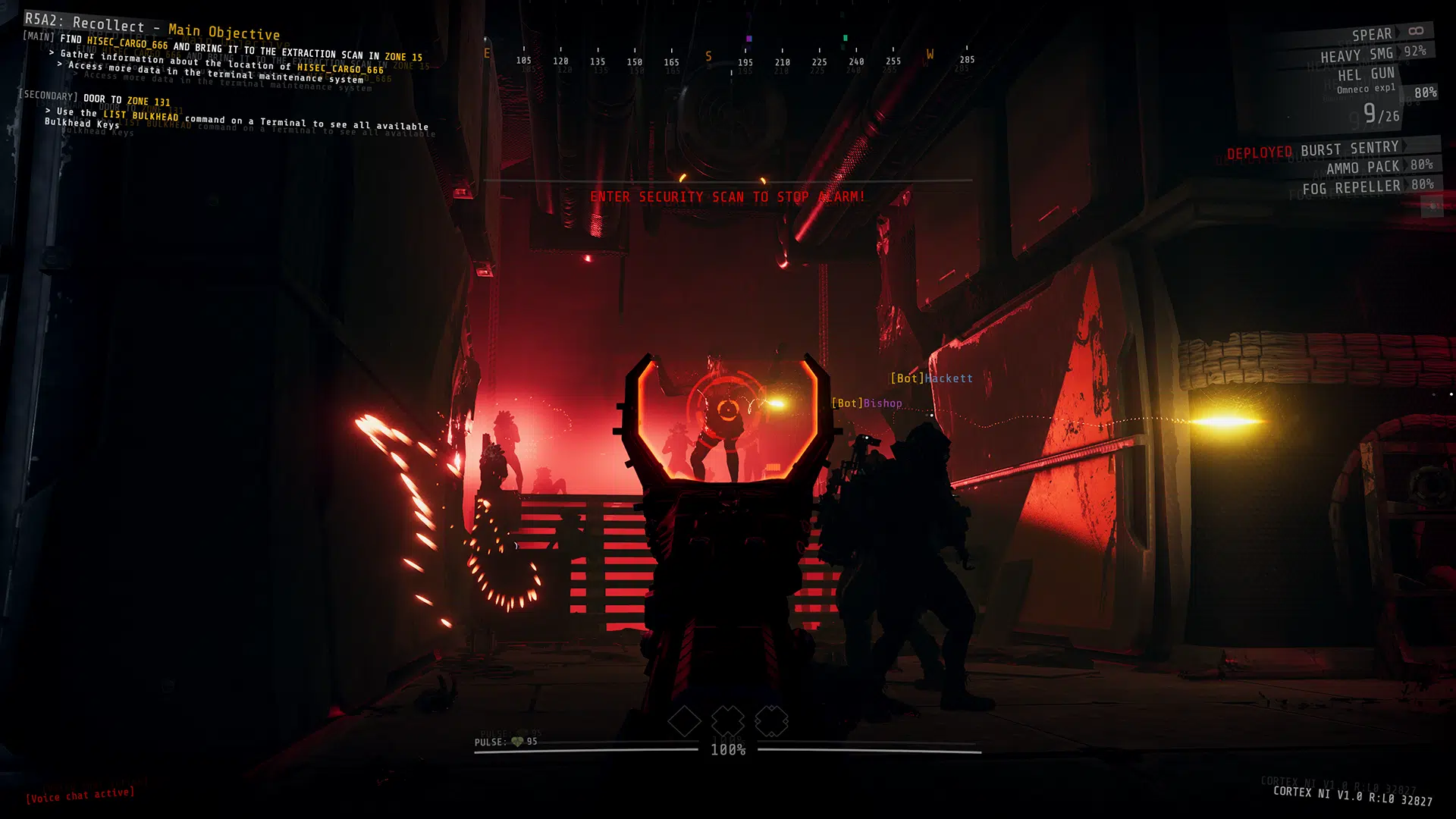Just a few weeks ago, 10 Chambers Collective announced a new heist-driven game titled “Den of Wolves.” This is particularly noteworthy given the game’s Creative Director, Ulf Andersson, was the game designer for Payday 1 and Payday 2.
While the studio is cooking that up, the devs also have another game out and it’s GTFO. Out on PC, we managed to talk to the studio about the chances of GTFO hitting consoles and other questions related to the game (and even Den of Wolves to some degree). Talking to us was Simon Viklund, studio co-founder.
MP1st: (Pertaining to Den of Wolves) How early is development right now.?
Simon: Well, most departments have left the experimentation phase or the pre-production, but I know we’re still experimenting with it. I’m head of the audio team as well. And they’re still experimenting a little bit with what systems to use and what the approach is.
But for the most part, we’re in production now. Trying to create actual locations and tie them together with the storylines and stuff like that. It’s not pretty enough. And it’s not polished enough. And not balanced enough to have people play it yet. Maybe next PR tour.
(Other studio rep): The goal is to have something playable next year. I don’t want to promise anything. We are obviously playing it at the office as well. Sort of like planned. Playable builds. We’re not trying to make an event out of it. But as Simon said, it’s nothing we want to show externally yet.
MP1st: There’s not going to be like any sort of Battle Pass or season progression thing?
Simon: No, I can’t say that it won’t be, but I can say that we haven’t planned it.
MP1st: Yeah, it doesn’t…didn’t give off that kind of vibe.
Simon: We don’t like trying to nickel and dime people and trying to trick people into committing to something before they know whether it’s good because that feels like what Season Passes often are.
Again, it goes into our philosophy to try to under-promise and over-deliver. We’re not the kind of company that would have an open beta a week before release and then not fix the bugs that come up in the open beta.
MP1st: Open beta is essentially just a pre-sale.
Simon: Yeah, it’s like a part of the hype. It’s a marketing tool and if you don’t use it as an actual test, and fix the things that you become aware of when you have the open beta, that feels fooling, try to fool the consumers. We’re not about that.
I’m not saying we’re not for sure not having a Battle Pass or Season Pass. But we’re sort of, if we go with it, it would be nice. Because it just doesn’t feel like us.
MP1st: Have you guys ever considered the free-to-play route?
Simon: Considered, yes. Early on. Maybe this is a free-to-play game. Like, let’s be open-minded, but no. It’s not gonna be free to play.
MP1st: You mentioned GTFO had 80 expeditions. How many are you aiming for here, or you don’t know yet?
Simon: We can’t say a number, obviously.
We’ll start with Early Access, and by then we just have to have enough content to warrant the price of Early Access. Early Access obviously is for the players who want to play an Early Access game, and it’s for us as well, so that we can get them to try it out and we can find out whether the game works the way we want it to work.
But once we’re out of early access, it’s more like yes, we need to, and we need a certain amount of game time to warrant the price obviously, and it becomes more serious, I can’t say now how many maps there are going to be because this is going to be different, some maps are like snack-sized prep missions, where you sort of smash and grab.
Locations in order to get the intel or the data or the gear that you need in order to take on the heist and then the heist is the more complex mission that takes an hour or something. It’s different, missions have different durations and it’s hard to measure. You wouldn’t really be able to measure game time by measuring the amount of maps.
It’s going to be a lot and the replayability is going to be awesome because once you’ve gotten through a storyline, you’re going to see that there were routes that you never took or missions you never took on because you found all the pieces and the gear and the stuff you needed in order to get to the end.
And you can replay it and try a different route. And it’s gonna be a different seed of that storyline that’s slightly different. It’s not like it’s going to be a completely different antagonist or something like that in a different company. But you can find the intel on the gear that you need to find in order to get to the end.
In different maps, we want to create an experience where you can actually go into a map, go into some office building at night and try to scrub the database of some company and then you don’t find the thing that you were looking for and you have to extract without the thing, and have people be more not on edge, but you don’t know for sure, and failure is part of, taking off the, it wasn’t here, then we’ll go over here and try to find the thing in this other building.
Maybe it’s in this branch of the same company. There are some unorthodox sort of approaches to how campaigns work.
MP1st: We’ve played GTFO. When you hacked into the terminals, it actually entered commands. So, is that going to be a part of this? Are there mechanics from GTFO that are going to transfer over?
Simon: Not that in particular, because it’s just hard to make that work on consoles.
MP1st It did make us feel a bit “smart.”
Simon: Yeah, because you know DOS commands.
That’s gonna be one of the challenges of making GTFO work on consoles. It’s just how do you make that work with a controller? That’s gonna be a challenge. We’re not gonna go down that route. Now with that, we’re considering building it from the get-go to work on consoles because it’s going to be something that’s more streamlined.
Something that we think is one of those things we want to refine. Indentables, based on what we did in GTFO is the fact that someone standing by the terminal, the rest of the team doesn’t know what you’re struggling with, what you are doing, what the commands are, what the password you need to find, are you pinging for something, are you having a hard time spelling, what is it, you know, that is taking so long, whatever it might be, and that’s frustrating for the rest of the team, they can’t see what you’re doing, so that’s an approach, we’re thinking about, how we can utilize the science fiction.
And have like AR elements and stuff like that in the world to allow people to know what the other teammates are struggling with or what they’re doing, what they’re trying to accomplish. So that you don’t need to, in DTF talk much and share your information. Like, I’m trying to do this and it’s not working.
Den of Wolves will try to create an experience where that information is shared. The game helps you share that information so that everyone knows what the rest of the team is trying to do. Standing over, huddling over a terminal, wouldn’t be conducive to that experience.
It would be like, if hacking is part of that experience, it would be brought into the 3D space, and then you’d see someone hacking, and you’d see them move around, and see them, see what they’re doing, and think in a different way.
MP1st: What other lessons have you taken from GTFO into this game?
Simon: It’s a lot of confidence in the fact that what we can do is a sort of successful experiment that we tried out in GTFO with mechanics surrounding corporate elements. It has to do with storytelling, it has to do with mission duration and complexity of our tools or the functions of our tools, the preparatory tools that we have.
It’s on every level. It’s on game design. It’s on code. It’s on everything. But a lot of it, on things, darlings, we had to kill doing the development of GTFO. We don’t have the time. We don’t have the resources. Now we’re revisiting those ideas.
MP1st: Still in the Unity engine, yes?
Simon: Yes.
MP1st: It’s always incredible to us every time we every time we play GTFO. Because typically, Unreal is seen as the prettier engine, right? But Unity is clearly capable of the same stuff.
Simon: It’s a tool. It’s how you use it, really. Unity has that reputation of being isometric, side scroller, or Max 3 type. Like, smaller type genres, or game types. But it’s a perfect engine to doodle around in and try stuff out, and that’s our creative process. It’s a lot about experimentation, and creating, quickly, creating prototypes.
Trying stuff out, and it’s a great tool for that. It just clicks well with our approach.
MP1st: Bringing back to the gameplay, do players align with certain companies and earn extra reputation? If you go and assassinate someone at one company, can you no longer do missions for them? Or are you guys too early to really have any of this?
Simon: No, we know exactly how we need to solve this.
Because we don’t want to create problems where it’s like, you’re going up against one, or you’re hired by one company. There’s a company involved in the story, and then you’re about to launch a mission, and then someone joins your server. Who has a bad standing with that corporation that you’re working for.
In order for the standing to matter, obviously, it has to have an effect. On the payout, or the loot that you get, or whatever it might be. We don’t want to create a game where someone ever has a reason to kick someone out because you have a bad standing with a corporation that we’re working for, so we can’t have you on the server and want someone with a good standing, that just doesn’t fly because it makes it unnecessarily complex.
You’re not going to have bad standing with any corporation, maybe you’re going to have good standing, and that allows you to access more, better loot. So it might go from a base level to a positive rather than having it ever be connected to some sort of a punishment.
We want to create a game if possible, Whenever someone joins, it’s like, Oh, you have that bonus? Something that affects the entire team is positive and just makes it, yeah, bring it on, everyone’s welcome.
Creating an experience where it’s like people have more of a reason to come together and to join and play with other people and have random people join rather than the other way around. They are looking for reasons not to have anyone kick them.
You just want to create an experience where it’s all a bonus
MP1st: Accessibility in the game. Obviously, GTFO is very hardcore. What are some more things that you’re doing, to not make it easy persay, but make it a little bit less unforgiving?
Simon: It’s not a high bar to clear.
It’s easier than GTFO, obviously. We found even though GTFO was the only game we’d made so far as Ten Chambers, you shouldn’t think of Ten Chambers as a company that’s founded to make hardcore games like that. Because we have experience with making more broad market type games, when did Payday The Heist and Payday 2.
In terms of difficulty, it is much more comparable to Payday 2. Mechanically, it’s a continuation or further investigation and refinement of mechanics. But GTFO was such a detour into a hardcore world. We’re coming back to something that’s more a continuation that also still has the DNA of mechanics and how things work in GTFO, especially with that sort of struggle for control and the fact that you can get back into stealth again. Elements like that I think it’s really interesting.
It has DNA from GTFO, but in terms of difficulties, much more closer, and should be compared more to Payday.
MP1st: For people who can’t maybe get a full party of four, what are their options?
Simon: We’re really trying to create an experience where it’s easy to play with randoms and make it easier for people to get along with randoms. So that’s a good approach. It’s not a game that’s meant to be played solo. It’s a co-op game; you’re meant to play with at least one other player.
But at this point, we can’t say for sure whether we’ll go the bot route or we’ll go trying to sort of mitigate the difficulty that would be if you’re fewer players, you obviously will struggle if you’re playing at the same level, at a level where the game is expecting the firepower of four players, we can’t answer exactly how we’ll do that right at the moment, but it will be a range.
The game will be, I think, most fun with four players while you can play with two as well. Maybe, maybe even more.
MP1st: What consoles? Are you targeting current-gen consoles, then?
Simon: Yeah. And we can’t say which ones?
(Other Rep) No, not yet. No. Uh, Uh, it’s still in discussions, basically.
Discussions and negotiations. Yeah.
MP1st: For the GTFO console version, you guys were just still kind of testing the waters there?
Simon: We’re looking at options for getting the right tools or help in order to turn it out on consoles. Which we haven’t done before.
We really mean it when we say we’re seriously considering it. We’re trying to get it off the ground.
Den of Wolves has no release date set just yet, but it is planned for release on PC. You can read our early preview of it here.




